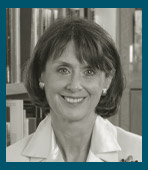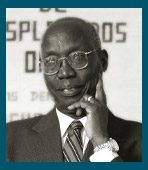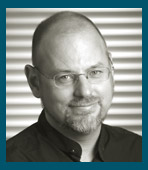 
CIS welcomes three new Fellows
This fall, MIT's Center for International Studies welcomes three new faces: Iraqi journalist Huda Ahmed, former U.S. Ambassador to Yemen Barbara Bodine, and Johns Hopkins Professor Francis Mading Deng.
Huda Ahmed has been named the Center's second Elizabeth Neuffer Fellow.
The Elizabeth Neuffer Fellowship, named after a Boston Globe reporter
who was killed while on assignment in Iraq in 2003, offers a woman
journalist the opportunity to focus exclusively on human rights
journalism and social justice issues. It is administered by the
International Women's Media Foundation (IWMF) in Washington, D.C.,
an organization that aims to strengthen the role of women in the
news media worldwide.
Ms. Ahmed, a graduate of Baghdad University's College of Languages, received recognition for extraordinary bravery from Knight Ridder for her work covering the war in Iraq. At CIS, Ms. Ahmed will pursue research and participate in Center events and programs, including the CIS Starr Forum. During her fellowship year, she also will have opportunities to work at the Boston Globe and the New York Times. Ms. Ahmed is on leave from her job as a correspondent for Knight Ridder in Baghdad, where she has written about the issues of women and children at risk in a war zone, the human rights abuses of police and occupying forces, and the struggles of women in politics in a Muslim society.
 Barbara
Bodine, a former career diplomat who served in 2003 as coordinator
for post-conflict reconstruction for Baghdad and the central governates
of Iraq, joined CIS as a Visiting Fellow on May 1, 2006. Ambassador
Bodine, who has already participated in CIS activities, including
the Center's Persian Gulf Initiative—a series of workshops that
examines specific problems in the Gulf and features experts from
the region—will expand her involvement during the coming year, with
participation in public forums, conferences and research projects. Barbara
Bodine, a former career diplomat who served in 2003 as coordinator
for post-conflict reconstruction for Baghdad and the central governates
of Iraq, joined CIS as a Visiting Fellow on May 1, 2006. Ambassador
Bodine, who has already participated in CIS activities, including
the Center's Persian Gulf Initiative—a series of workshops that
examines specific problems in the Gulf and features experts from
the region—will expand her involvement during the coming year, with
participation in public forums, conferences and research projects.
Ambassador Bodine is a graduate of the University of California,
Santa Barbara, magna cum laude and Phi Beta Kappa, in Political
Science and in Asian Studies, and The Fletcher School of Law and
Diplomacy. Formerly a Senior Fellow at the Belfer Center for Science
and International Affairs, Bodine spent most of her 30-year diplomatic
career in the Middle East and the Arabian Peninsula. She was Ambassador
to Yemen when the USS Cole was attacked in 2000, Deputy Principal
Officer in Baghdad during the Iran-Iraq war, and Deputy Chief of
Mission in Kuwait during the Iraqi invasion and occupation in 1990.
 Francis
Mading Deng, an expert on human security, joined CIS on July 1,
2006, as the Center's Robert E. Wilhelm Fellow. The one-year fellowship
is awarded by MIT's Center for International Studies to individuals
who have held senior positions in public life. Deng is Research
Professor of International Politics, Law and Society, and Director
of the Center for Displacement Studies at the Johns Hopkins University
School of Advanced International Studies in Washington, D.C. Francis
Mading Deng, an expert on human security, joined CIS on July 1,
2006, as the Center's Robert E. Wilhelm Fellow. The one-year fellowship
is awarded by MIT's Center for International Studies to individuals
who have held senior positions in public life. Deng is Research
Professor of International Politics, Law and Society, and Director
of the Center for Displacement Studies at the Johns Hopkins University
School of Advanced International Studies in Washington, D.C.
Ambassador Deng, a Distinguished Visiting Scholar at the Kluge Center of the Library of Congress, served from 1992-2004 as the Representative of the United Nations Secretary-General on Internally Displaced Persons. Formerly a Foreign Minister of Sudan and Sudan's Ambassador to the U.S., Deng is a leading scholar of indigenous cultures and the role of tradition in development, the politics and conflicts of identity in the Sudan, conflict management and the challenges of nation building in Africa, and the global crisis of internal displacement.
Ambassador Deng has been involved in numerous peace efforts and
has collaborated with prominent mediators, including President Olusegun Obasanjo of Nigeria and former U.S. President Jimmy Carter. He is the author of several books about the Dinka of Sudan, and has written or co-authored numerous other volumes, including: Protecting the Dispossessed: A Challenge for the International Community; Conflict Resolution in Africa; Masses in Flight: the Crisis of Internal Displacement; Human Rights in Africa; and Forsaken People: Case Studies of the Internally Displaced.
The MIT Center for International Studies conducts research and teaching
in a wide range of international subjects, including development studies, comparative politics, international relations, social movements, security studies, and international science and technology.
_____________________________________________
 Stefan
Helmreich awarded 2006 Levitan Prize Stefan
Helmreich awarded 2006 Levitan Prize
The 2006 Levitan Prize in the Humanities was awarded in March 2006 to Associate Professor of Anthropology Stefan Helmreich. Helmreich, who joined the MIT faculty in 2003, received the BA from the University of California, Los Angeles in 1989, and the MA and PhD from Stanford University in 1992 and 1995, respectively.
The $25,000 Levitan prize was established through a gift from the late
James A. Levitan, a 1945 MIT graduate in chemistry, a member of the MIT Corporation, and Of-Counsel at the law firm of Skadden, Arps, Slate, Meagher and Flom of New York City. First awarded in 1990, the Levitan Prize supports innovative and creative scholarship in the humanities by SHASS faculty members.
Helmreich will use the Levitan Prize to support research for his book, Alien Ocean: An Anthropology of Marine Microbiology and the Limits of Life, an ethnographic project that examines how marine biologists encounter and describe realms of the sea out of everyday sight and reach: the subvisible world of microbes, the deep sea, and areas outside national sovereignties.
Previous honors for Helmreich include the Nicholas Mullins Award for Outstanding Graduate Scholarship in Science and Technology Studies from the Society for Social Studies of Science (1995), the Diana Forsythe Book Prize from the American Anthropological Association (2001), and an Individual Research Grant from the Wenner-Gren Foundation for Anthropological Research (2003).
top
back
|
|